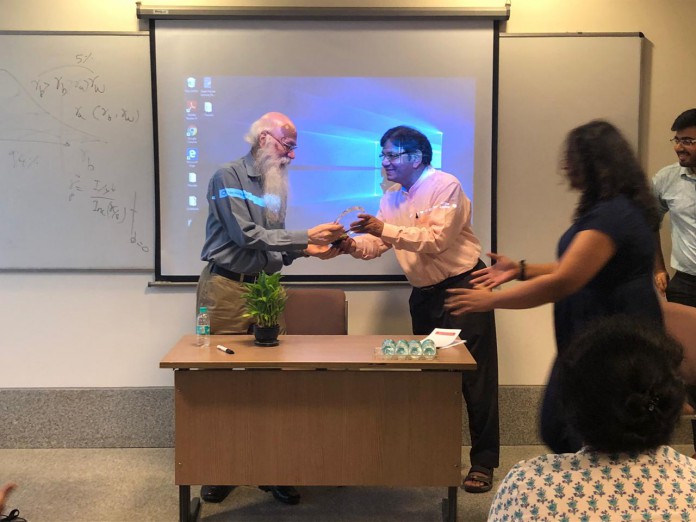New Delhi, August 27, 2019: Dr. Arun Kumar, Former Economics Prof. at JNU and currently the Malcolm S Adiseshiah Chair Professor at the Institute of Social Sciences, New Delhi, today delivered a public lecture on the topic ‘Missing Dimension of Macro Policy-Making in India: The Black Economy’ at Indian School of Business & Finance (ISBF), one of the five Featured Teaching Institutions (FTI) of The London School of Economics.
During the session, Prof. Kumar shared his insights on ‘Missing Dimension of Macro Policy-Making in India’, which he believed is what enables a parallel economy, the real functioning of Black Economy in India and around the globe. Taking ‘Demonetization’ as an example, he elaborated on various countermeasures taken by authorities around the globe to include the missing dimension. During his interaction, he also shared the various misconceptions that are prevalent with regards to the robust back-door economy, the ‘Black Economy’.

Important Announcement – EasyShiksha has now started Online Internship Program “Ab India Sikhega Ghar Se”

Top Courses in Virtual Reality
More Courses With Certification
Dr. Arun Kumar taught Economics at Jawaharlal Nehru University from 1984 to 2015. He was also the Sukhamoy Chakravarty Chair Professor in the Centre for Economic Studies and Planning, JNU and has been a Vice President and acting President of the Indian Academy of Social Sciences. He is currently the Malcolm S Adiseshiah Chair Professor at Institute of Social Sciences, New Delhi. He has specialized in Development, Public Finance, Public Policy and Macroeconomics.
Giving the reference of his book, ‘The Black Economy in India’, published by Penguin (India) in 1999, 2002 and 2017, he stated that 62 per cent of the economy is not accounted for in policy-making, as it operates through channels not recorded. His other authored works include, `Indian Economy since Independence: Persisting Colonial Disruption’ (2013), along with `Understanding Black Economy and Black Money in India: An Enquiry into Causes, Consequences and Remedies’, Aleph Publication (2017) and `Demonetization and the Black Economy’ Penguin India (2017). His latest book on GST, titled `Ground Scorching Tax’ was released in February 2019. He has also been awarded the Ricardo Prize in Economics by IIES of UNAM, Mexico in 2013.
During his session at ISBF, Prof. Arun Kumar said “The Black economy not only impacts the overall economy but it also affects other crucial sectors, like Education and Health. The bigger the black economy, lower the money available for the government to disburse for education, which would affect the quality of education, hence promoting deteriorating mediocrity among youth.”
Top Courses in Software Engineering
During the occasion, Founder & Director of ISBF, Dr. Jitin Chadha said, “We are glad to have Prof. Arun Kumar as our guest lecture today. His deep knowledge and understanding of economy and policy-making have helped not only the students but also the faculty of ISBF. We have been fortunate to have such insights into policymaking and prevalence of alternative economies and their functioning.”
Prof. Kumar concluded by sharing some short, medium & long term remedies that could be opted to curb the Black Economy followed by a Q&A session with the students.
About Indian School of Business & Finance (ISBF)
ISBF was founded with the vision of delivering world‐class education in India. Its undergraduate and postgraduate programmes – in the areas of Economics, Finance, Accounting, Business and Management – all receive academic direction from LSE, and students receive a University of London degree upon graduating. They are taught by an expert and highly qualified group of faculty members at ISBF, and also see deep engagement from LSE academicians, who train ISBF’s teachers as well as lecture students, apart from setting and grading the final examinations of ISBF students.
Today, ISBF is one LSE’s top 5 Teaching Institutions in the world, and also enjoys Affiliate Centre status from the University of London, which is the highest recognition accorded to Teaching Institutions by the university. This ensures that ISBF students receive a rigorous, application-oriented and global education, which is relevant to local needs. Many of them transfer to foreign universities in the second year of undergraduate study, go on to prestigious institutions for higher study, or secure placements in India or overseas with leading multinational corporations.
Top Courses in Networking
Empower your team. Lead the industry
Get a subscription to a library of online courses and digital learning tools for your organization with EasyShiksha
Request NowQ. Are EasyShiksha's internships truly free?
Yes, all internships offered by EasyShiksha are completely free of charge.
Q. How can I apply for an internship with EasyShiksha?
You can apply by visiting our website, browsing available internships, and following the application instructions provided.
Q. What types of internships are available through EasyShiksha?
EasyShiksha offers a wide range of internships across technology, business, marketing, healthcare, and more. Opportunities are continuously updated.
Q. Will I receive a certificate upon completing an internship?
Yes, upon successful completion, you will receive a certificate recognizing your participation and achievements.
Q. Are EasyShiksha's internship certificates recognized by universities and employers?
Yes, the certificates are recognized by universities, colleges, and employers worldwide.
Q. Is the download of certificates free or paid?
Access to internships and courses is free, but there is a small fee to download certificates, covering administrative costs.
Q. When can I start the course?
You can choose any course and start immediately without delay.
Q. What are the course and session timings?
These are fully online courses. You can learn at any time and pace. We recommend following a routine, but it depends on your schedule.
Q. What will happen when my course is over?
After completion, you will have lifetime access to the course for future reference.
Q. Can I download the notes and study material?
Yes, you can access and download course materials and have lifetime access for future reference.
Q. What software/tools would be needed for the course?
All necessary software/tools will be shared during the training as needed.
Q. I’m unable to make a payment. What should I do?
Try using a different card or account. If the problem persists, email us at info@easyshiksha.com.
Q. Do I get the certificate in hard copy?
No, only a soft copy is provided, which can be downloaded and printed if required.
Q. The payment got deducted but shows “failed”. What to do?
Technical errors may cause this. The deducted amount will be returned to your account in 7-10 working days.
Q. Payment was successful but dashboard shows ‘Buy Now’?
Sometimes payment reflection is delayed. If it takes longer than 30 minutes, email info@easyshiksha.com with the payment screenshot.
Q. What is the refund policy?
If you face technical issues, you can request a refund. No refunds are issued once the certificate has been generated.
Q. Can I enroll in a single course?
Yes, select the course of interest, fill in the details, make payment, and start learning. You will also earn a certificate.
Q. My questions are not listed above. I need further help.
Contact us at info@easyshiksha.com for further assistance.
ALSO READ:soil-fertility-what-does-it-really-mean
Get Course: Web-Development-with-PHP-MySQL-Database






































































